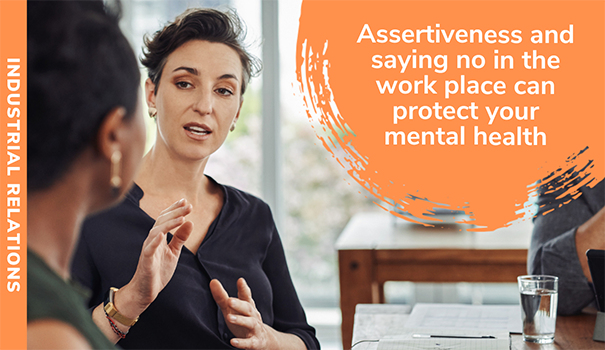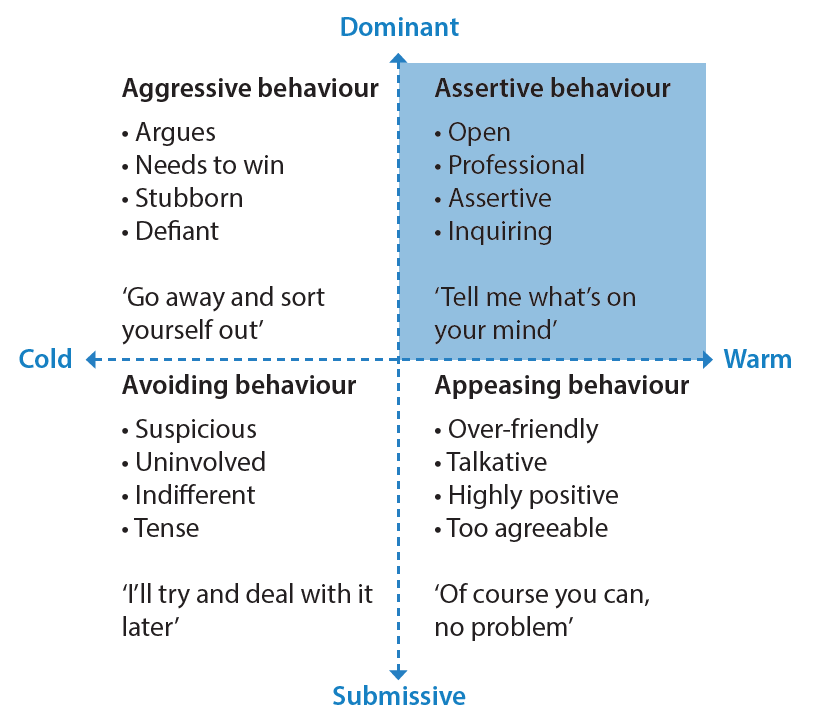Assertiveness and saying no in the work place can protect your mental health

Knowing how to say no at work and how to express your right to be assertive in the work place can protect your mental health from psychosocial hazards.
In a recent article by the IEU-QNT branch (published in the IEUA Bedrock Magazine which focuses on the early childhood education and care (ECEC) sector) they identify the highly feminised nature of the ECEC profession and the tendency for women to apologise more as they have a lower threshold than men for what they consider is offensive.
IEU-QNT Industrial Services Officer, Monique Roosen, advises members to identify the situations that have them apologising and creating stress for them and learn how to ask for assistance. For example, they may not have achieved their daily workload due to uncontrollable factors whilst attending to needs of a child, but shouldn’t apologise for not achieving the workload – they should ask for support.
Members also need to know they have a legal right to refuse to undertake work in an unsafe environment. Monique advises that: “If something doesn’t feel right, or you are unsure about your legal rights at work, we always encourage members to contact our union and speak with one of our Organisers to discuss your rights to refuse work.”
To feel empowered in the workplace, it is important to know when you have the right to say ‘no’, without apology or reservation and assert your rights.
What is assertiveness in the workplace?
The FairWork Ombudsman (FWO) defines assertiveness as the mid-point between being passive (or too agreeable) and being aggressive.
Assertive people:
- feel free to express their feelings, thoughts, and desires
- state their opinions, while still being respectful of others
- control their anger and speak in a calm and rational manner
- are willing to compromise with others, rather than always wanting their own way.
The FWO diagram below highlights different behaviours that people can display during conversations. You are more likely to resolve a situation if your behaviour during a difficult conversation is in the blue “assertive behaviour” zone.

Image © FairWork Ombudsman
Safe Work Australia recently published a model code of practice, Managing Psychosocial Hazards at Work, which puts the onus on employers to manage hazards that may present a risk to employee’s psychosocial health.
Poor organisational justice is becoming a more frequent cause of psychosocial hazards
Wendy Evans, IEU(SA)’s Deputy Secretary and Workcover Manager says: “a psychosocial hazard we are dealing with more and more is poor organisational justice in the workplace.”
“Poor organisational justice means a lack of:
- procedural justice (e.g. fair decision making processes)
- informational fairness (e.g. keeping everyone up to date and in the loop), or
- interpersonal fairness (e.g. treating people with dignity and respect).
Poor organisational justice may include:
- favouritism
- blaming workers for things that aren’t their fault or they can’t control
- failing to appropriately address (actual or alleged) issues (e.g. underperformance, misconduct, or inappropriate or harmful behaviour such as bullying).”
Advice to members
If you are the subject of poor organisational justice, you can say I need the detail and the particulars of the allegations, misconduct or harmful behaviour.
You can say, I need an agenda and you can say I need to have a representative or support person with me.
You don’t need to apologise.
If you have any questions about assertiveness in your workplace or concerns that poor organisational justice in your workplace is creating a psychosocial hazard, contact our office – 8410 0122 or enquiries@ieusa.org.au
For further reading on Managing Psychosocial Hazards at Work, see our Class Action, August 2022 article here: https://ieusa.org.au/managing-psychosocial-hazards-at-work
Sources
IEUA Bedrock Magazine, issue 3, Vol 28, 2023, p14-15. How assertiveness in the workplace can protect your mental health. https://publications.ieu.asn.au/files/4216/9404/7897/Bedrock_3_2023_FINAL.pdf
Fairwork Ombudsman, How to handle a difficult conversation.
https://www.fairwork.gov.au/sites/default/files/minisite/static/39180a88-60ab-498d-9b25-d77243756cef/difficult-conversations-in-the-workplace-employee-course/assets/downloads/employee-how_to_handle_a_difficult_conversation.pdf

